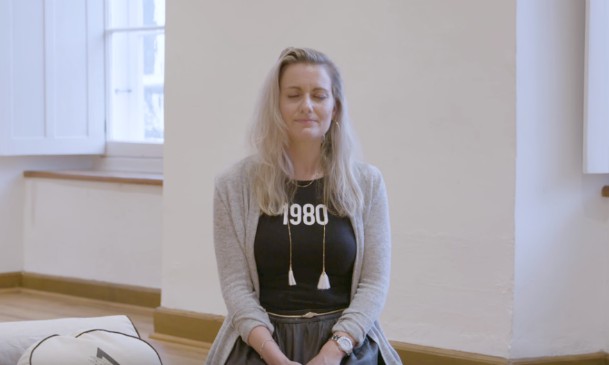What is Meditation?
There is a lot of talk about meditation and mindfulness! It’s a sign of the times; every good bookstore now has a section dedicated to the subject. Even the word “mindfulness” seems to be the magical ingredient to make any activity even more pleasant. To better understand its potential, our partner Marie Ève Lécine, Guidance Counsellor and Professor of Meditation, explains what meditation is. Marie Ève hosts the Rendez-vous méditation au Monastère and gives training sessions for the general public.
What is meditation? Why is it so widespread?
Meditation, in its most basic definition, is the training of one’s mind—just as physical exercise is training for the body. When exercise was an emerging practice, when doing exercise was yet too “new” to be accepted by everyone, it had to go through a process of attracting people to it, by demonstrating its benefits on the body and overall health so that it became an essential part of people’s lives. Now it is mediation’s turn to go through these same stages in order to be recognized for its true value. And thanks to scientific research, particularly advances in neuroscience, meditation’s benefits are well-established.
I don’t consider meditation as being a fad, because it’s an old practice found in many traditions and religions. It is not a fly-by-night concept; rather, it is an intrinsic need for humankind. It’s an increasingly more alarming need as well; I affectionately call it the SRW21 (Stressed and Rushed Westerners of the 21st century), since meditation is an antidote for many of our modern diseases, such as stress, lack of attention, absent mindedness, and so on.
Is mindfulness a form of meditation?
First of all, there is meditation, which is a training of the mind. To continue my comparison with physical exercise, there are several kinds of meditation—just as there are several kinds of exercises.
Mindfulness is both simple and complex at the same time. Mindfulness is choosing to reconnect with the present, as it is, without judging it, without changing it, without idealizing it, and without regretting it. This may seem simple, but when we reflect upon ourselves properly, we often realize that we are not necessarily in the present (our mind may wander towards regrets, anxieties, aspirations, etc.). It is also possible to struggle with what “is” by not accepting reality and negatively judging the “here and now.”
There are also many kinds of mindfulness meditation approaches, but the most “purist” one is mindful breathing, because it is practiced independently without a guide or any support.
How to approach mindfulness meditation?
Taking a course is a good start. There are so many myths and preconceptions about meditation that at least once in your life you should have someone “demystify” them so that you can more easily adopt the practice. For those who prefer learning on their own, a book can help.
However, meditation is first and foremost a practice and you have to perfect it by experience. It is therefore necessary to practice it regularly, even if only a little at a time, rather than becoming an expert on the subject. Personal transformations, which often come fast, along with regular practice, are a wonderful source of motivation. But to discover them, you first have to get started…
And what about guided meditation?
In the case of guided meditation, people are invited to take an inward journey to get in touch with themselves, including using mental imagery and visualization. The goal is to enable them to feel beautiful emotions (e.g., love) and qualities (e.g., patience). This type of meditation is affectionately called “the training wheels of meditation” because, like a bike, it is a great way to begin! I have so much to say, I will write another article all about it!
What advice do you have for a beginner in meditation?
Starting with guided meditation is a wonderful start! It therefore may be interesting to explore more independent practices, such as mindfulness meditation. In this case, I strongly recommend taking a course! Le Monastère offers several types of classes, such as an introduction to mindful breathing and another for guided meditations. These courses are very popular!
I would suggest starting gradually, perhaps for a few minutes twice a day. I would also advise you to join a group of meditators, on a regular basis, to stoke your motivation. Le Monastère has created rendezvous meditation, which is held once a month, to give those who need it an opportunity to meditate (in silence, but also a guided one).

Do you have any questions? Email Marie Ève at: mel@Letitbemeditation.com
www.letitbemeditation.com


